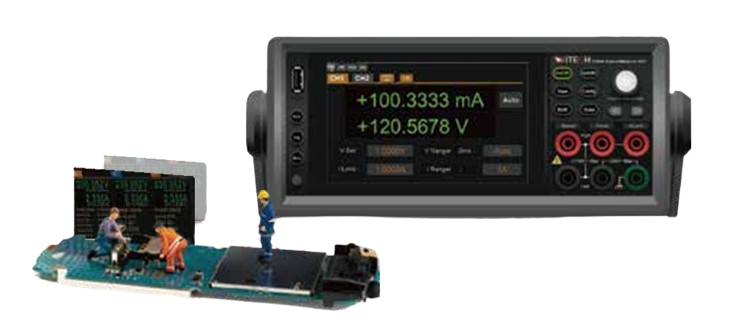Semiconductor/IC Innovation Lab
With the popularization of mobile communication concept such as mobile phones and the IoT, IC technology has become the basic of all information technology industries today.
ITECH works closely with leading semiconductor companies to provide semiconductor/power IC testing solutions, covering a wide range of fields like automotive electronics, optical communications, renewable energy, industrial automation, LED and so on. In order to meet the experimental teaching and scientific research needs in colleges and universities, ITECH can provide testing solutions for discrete semiconductor devices, power semiconductor devices, optoelectronic devices, sensors, power management chips and products in downstream industries . We help to accelerate the cultivation of talents that are in the design, testing and process of integrated circuit industry in universities.
Semiconductor discrete device performance experiment
Semiconductor discrete devices generally include diodes, transistors, and thyristors, which are core devices that constitute power electronic devices. They have the functions of rectification, voltage stability,switching, frequency adjusting in the power electronic equipment.
It is widely used in many fields such as consumer electronics, automotive electronics, electronic instrumentation, industrial and automatic control, computer, telecommunications, etc.
Power semiconductors such as IGBTs and MOSFETs are widely used in brushless DC motors, high-power DC-DC power supplies, home appliances, stepper drives, inverters and so on.
Test items
Cycle aging test and double pulse test – IT6000D high-power DC power supply/IT-M3900 DC power (high voltage and high current test requirement) Static current test, driving current test, high temperature and high voltage reverse bias test, high temperature gate reverse bias test – IT-M3200 high-precision DC power supply/IT-M3100 DC power supply/ IT-M3300 regenerative electronic load/IT2800 high-precision SMU.
Recommended Products
- IT6000D high power DC power supply
- IT-M3900 bidirectional DC power supply
- IT-M3100 DC power supply
- IT-M3200 high precision DC power supply
- IT-M3300 regenerative DC electronic load
- IT2800 high precision SUM

IT-2800 Source Meter
- Set five equipment in one: voltage source, current source, voltmeter, ammeter and ohmmeter
- High precision 4 quadrant output, support 2 line and 4 line measurement
- Resolution up to 100fA, 6 1/2 Settings and display resolution
- Pulse output capacity (200V and 40V models)


Principle and application experiment of semiconductor optoelectronic devices
Semiconductor optoelectronic devices include LEDs, laser semiconductors, light receiving devices, optocouplers (optocoupler relays, optocoupler circuit breakers), optical communication devices, etc.
Experiment 1: Optocoupler Relay Test
The optocoupler relay is a non-contact switching device with relay characteristics that uses semiconductor components instead of electrical contacts as a switch. It is widely used in computer peripheral interface devices, numerical control machinery, remote control systems, industrial automation equipment, precision instruments, etc. When testing optocoupler relays, high current is the main cause of damage to its internal components. Some products will generate a large surge current at the moment of switching on, so it is very important to ensure a certain current redundancy during the experiment.
Test items
Lighting test, burn-in test,
power supply test

Recommended Products
- IT-M3900C Bidirectional Programmable DC Power Supply
- IT6000C high power bidirectional DC power supply
Experiment 2: 5G Optical Module Test
Optical modules are the basic component of 5G communication networks. ITECH provides testing solutions including power performance testing, protocol analysis, reliability testing, EMC testing for the research and development of high-speed optical modules and related high-precision equipment.
It requires: the dynamic response of the power supply is less than 20us, the voltage rise and fall time is less than 5ms, and the current accuracy is at the mA level.
Recommended Products
- IT6341C dual-channel high precision DC power supply( 5V/16A 16V/5A )
- IT2800 high precision SMU

Application 3: Laser test
The laser test has extremely high requirements on the power supply, which is a constant current power supply. The traditional power supply defaults to the CV loop priority, and the speed of suppressing the current overshoot at the moment of startup is slow. ITECH’s programmable DC power supplies have CC/CV priority function. Users can adjust the loop speed according to the test requirements, and choose the test of high voltage in CV mode, or the CC priority mode without current overshoot.

Recommended Products
- IT-M3100D dual-channel programmable DC power supply
- IT6900A DC power supply(model special for no current overshoot, switch+line structure, low ripple, low noise)
Sensor principle verification and detection experiment
A sensor refers to a device or device that converts non-electricity into electricity that has a definite relationship with it. It usually consists of sensitive parts and conversion parts. When the active sensor is applied and detected, it needs an power supply to complete the detection experiment.
Recommended Products
- IT-M3900C Bidirectional Programmable DC Power Supply

